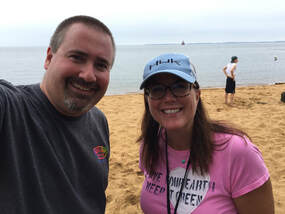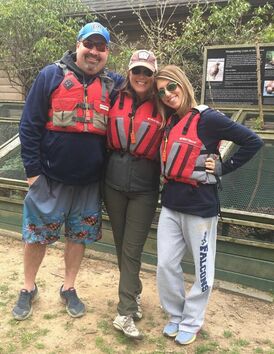Systemic Sustainability: 1.2 Professional Development
Science Department Professional Development
Several teachers have devoted a tremendous amount of time and energy to participate in a myriad of professional development programs, which benefit all of their students and the overall quality of the SPMS green program. Their pursuit of new information, innovative teaching methodologies and project-based educational opportunities continue to inspire their peers and cultivate increased commitment to the green school program. A sampling of teacher accomplishments is listed below.
|
Jennifer Shelleman: 8th Grade Science; Department Chair
As Department Chair, Mrs. Shelleman has attended numerous science department chair workshops at Arlington Echo. Professional Development:
Michael Philip: 8th Grade Science Teacher/Environmental Club Sponsor/Green School Liaison
Nichole Werre: 8th Grade Science Teacher Terrapin Connections: Implementing this program at SPMS requires attendance at an annual 3 hour professional development/lecture every fall. It is led by Dr. Willem Roosenburg, the leading turtle expert in the country. The head-starting of terrapins is part of his research study from the University of Ohio. Debbie Sparby – Grade 6
Governor's Schoolshed Initiative: Professional development was provided to prepare teachers to engage their students in stream study, data analysis, and action projects. Attended all day workshop to learn how to plan an action project with students to either plant or collect organisms near a stream to measure biodiversity and stream health. The program was spearheaded by Britt Slattery of DNR. BEST program: Participated in an all-summer internship with Maryland Sea Grant, funded through NASA, to measure water quality and learn about the impacts on the Chesapeake Bay. A highly extensive training program, with numerous experiments and field work, culminated in a presentation to a panel of professors regarding water quality findings and more importantly, how this experience would be incorporated back in her SPMS classroom. The training continued for one weekend per month for the entire school year to learn about inquiry based instruction and create a unit plan that incorporated her research experience at Maryland Sea Grant. In addition, a program instructor visited SPMS to observe Mrs. Sparby in her own classroom. She was then invited to use this experience to model this teaching methodology using another lesson for all AACPS Department Chairs to further their own professional development. NASA GPM Master Teacher: Selected with 20 other worldwide educators to participate monthly in the GPM Master Teacher program. GPM is a NASA satellite mission that maps global precipitation and is the next generation of the TRMM satellite. It has enhanced capability to map a larger swath of the Earth, and data is being collected by NASA on precipitation around the globe. This program requires data collection during class with SPMS students, using a weather center in the courtyard and a weather tracker system, allowing the students to collect weather data daily and report measurements to NASA. The training also requires that she complete a monthly NASA GPM activity that focuses on the mission. Topics have included Extreme Weather, The Water Cycle, The Mission, Climate Change, Engineering of the Satellite itself and Accurate Measurement. |
|


